The International Symposium on Energy and Environment, sponsored by the McDonnell International Scholars Academy, brought prominent international university presidents and leaders to St. Louis May 4-7.
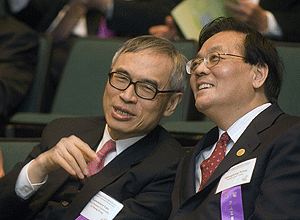
The leaders of 11 premier universities in Asia and the Middle East, along with Chancellor Mark S. Wrighton, discussed ways their institutions are addressing global energy and environmental concerns.
The four-day event included addresses by a former U.S. ambassador to the United Nations, the president of the National Academy of Sciences and Monsanto Co.’s top executive; a Presidents Forum, presentations and workshops; a tour of the “Ansel Adams: Reverence for Life” photography exhibition at the Kemper Art Museum; and sessions on environmental education, energy and environment, aerosols and air quality and health, and water resources and sustainable systems.
During closing remarks, Wrighton announced that the University would provide an additional $500,000 to the McDonnell Academy to fund research and educational collaborations developed during the weekend symposium.
In his address to the participants, Wrighton called for universities worldwide to marshal their resources for a global effort to secure a brighter, sustainable future. Speaking on behalf of the participants, Wrighton issued a call to action.
Call to Action
|
To watch a video of Wrighton and other university presidents offering a call to action, visit news-info.wustl.edu/news/page/normal/9470.html. |
“Energy and environmental issues represent the greatest challenges of this century. This international conference has stimulated premier universities around the world to marshal their human and financial resources to meet these grand challenges. Many of the world’s most talented students and academic leaders are poised to assure a brighter, sustainable future. We call on all segments of society to join us in this vital effort to secure this future.
“Academic leaders, including 12 presidents, of the 21 Partner Universities in the McDonnell International Scholars Academy met at Washington University in St. Louis and shared information about their education and research programs, policy studies and operations related to energy and environment. Developed and developing countries alike have a vital interest in abundant and affordable energy while at the same time preserving the environment.
“International cooperation and collaboration will accelerate the progress in meeting the challenges associated with energy needs, assuring clean water and air, and addressing the global consequences from the accumulation of greenhouse gases. Research universities have the responsibility to prepare the next generation of leaders in the professions, in business, in government and in academia.
“The talented students and faculty of the Partner Universities of the McDonnell International Scholars Academy, working with their governments, with corporations and with foundations have the potential to build a better world for all people of the world.
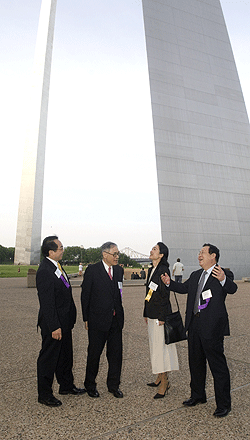
“The McDonnell International Scholars Academy will nurture the development of international programs of education and research to address problems related to energy and environment, and the McDonnell Academy leaders call on all institutions and people to work cooperatively to solve the problems we face.
“The McDonnell Academy will encourage governments to support such international programs. The Academy plans to convene a second summit on energy and environment in December of 2008 in Hong Kong and that meeting will engage graduate students and faculty of our Partner Universities working on these global problems.
“The four areas of future collaboration are: education, research, social science and policy studies, and university operations.
“Education. The Partner Universities of the McDonnell Academy have established a summary of educational programs and course offerings of the 21 Partner Universities related to energy and environment. Educational programs for undergraduates, graduate and professional students, as well as programs to educate the public are needed to respond to the challenges associated with energy and environment. Programs range from science and engineering to architecture, social sciences, and medicine. The Partner Universities are committed to meeting the responsibility of providing the best educational experiences for students destined to be leaders later in this century. The McDonnell International Scholars Academy will foster faculty and student exchange programs to develop collaborative relationships in education.
“Research. New knowledge and the application of new knowledge to solve energy and environmental problems are needed. Breakthrough research and the development of “disruptive” and green energy technologies will be aggressively pursued, and in the immediate future effort must also be directed to developing and implementing carbon dioxide sequestration technologies. Research in areas such as renewable energy, including biofuels and photovolatics, is promising, but near-term opportunities also include improvements in the efficient use of fossil fuel resources through understanding of clean combustion processes, catalysis, engines, and use of advanced building materials. Partner Universities of the McDonnell International Scholars Academy are conducting high-quality research related to energy and environment, and the Academy will work to develop specific research programs that bring together faculty and students from around the world to accelerate the pace of energy and environmental research.
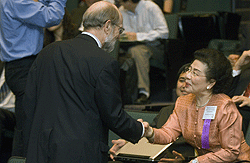
“Social Science and Policy Studies. Advancing the progress in meeting the energy needs of the world will require cooperative efforts to understand the myriad of consequences of an approximate doubling of energy consumption by 2050. Research universities of the McDonnell International Scholars Academy represent premier intellectual resources where the problems can be defined, debated and discussed in objective forums. Building a sustainable future is a universal aspiration. The McDonnell Academy resolves to provide opportunities to gather academic, government, and corporate leaders from around the world to assist national leaders in formulating and implementing the best policies to meet the economic interests and needs of the world’s people.
“Operations. Each of the Partner Universities in the McDonnell International Scholars Academy strives for excellence in all that they do and provides the best educational and research environment at the lowest possible cost. Improving efficiency in use of energy, for example, has already significantly lowered the cost of energy at major research universities of the Academy. Emerging as leaders in ‘best practices’ in connection with energy and environmental issues is an important aspiration for all 21 Partner Universities. The McDonnell International Scholars Academy will develop procedures for the partner universities to communicate with each other and to become aware of advances around the world to improve the efficiency of energy utilization, to understand the best practices associated with new buildings and renovation of existing buildings, and to communicate with other large institutions to encourage them to embrace the best policies and practices.”
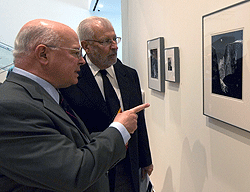
Ira J. Kodner (left), the Solon and Bettie Gershman Professor of Surgery and director of the Center for the Study of Ethics & Human Values, chats with alumnus Michael Adams (’67), son of photographer Ansel Adams, during a special preview of the exhibition “Ansel Adams: Reverence for Life” May 6 at the Kemper Art Museum.
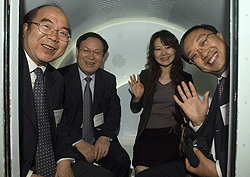
(From left) Jiming Hao, director of the Institute of Environmental Sciences and Engineering at Tsinghua University; Gu; Yuan Yuan, deputy chief of the Division of International Liaison at Tsinghua University; and Yi Zhang, director of the International Office at Tsinghua University, prepare to ride to the top of the Gateway Arch May 5.
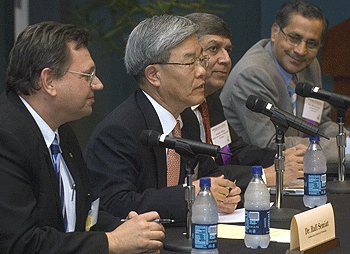
(From left) Rafi Semiat, head of the Grand Water Institute at Technion – Israel Institute of Technology; Chang Young Jung, president of Yonsei University; Ashok Misra, director of the Indian Institute of Technology Bombay; and B.B. Bhattacharya, vice chancellor of Jawaharlal Nehru University, address the audience during a May 5 session on “Educating Future Generations on Energy and Environment.”
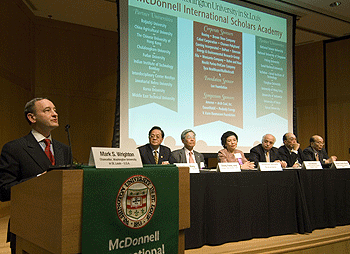
Chancellor Mark S. Wrighton (left) and a panel of international university presidents discuss ways to move forward at the symposium’s concluding session May 7. Joining Wrighton are panelists (from left) Wang; Jung; Kiranandana; Ural Akbulut, president of Middle East Technical University; Usman Chatib Warsa, rector of the University of Indonesia; and Si-Chen Lee, president of National Taiwan University.